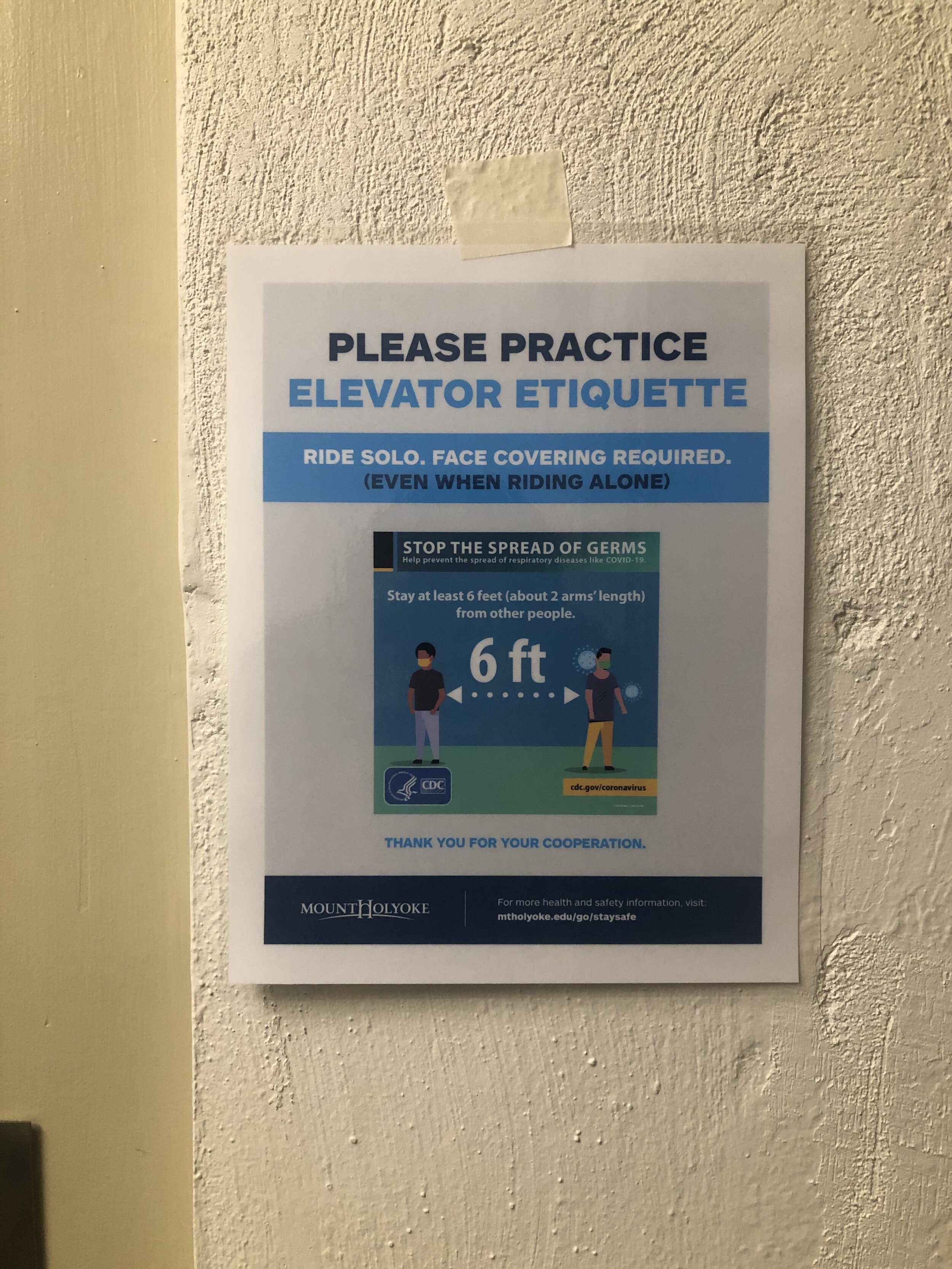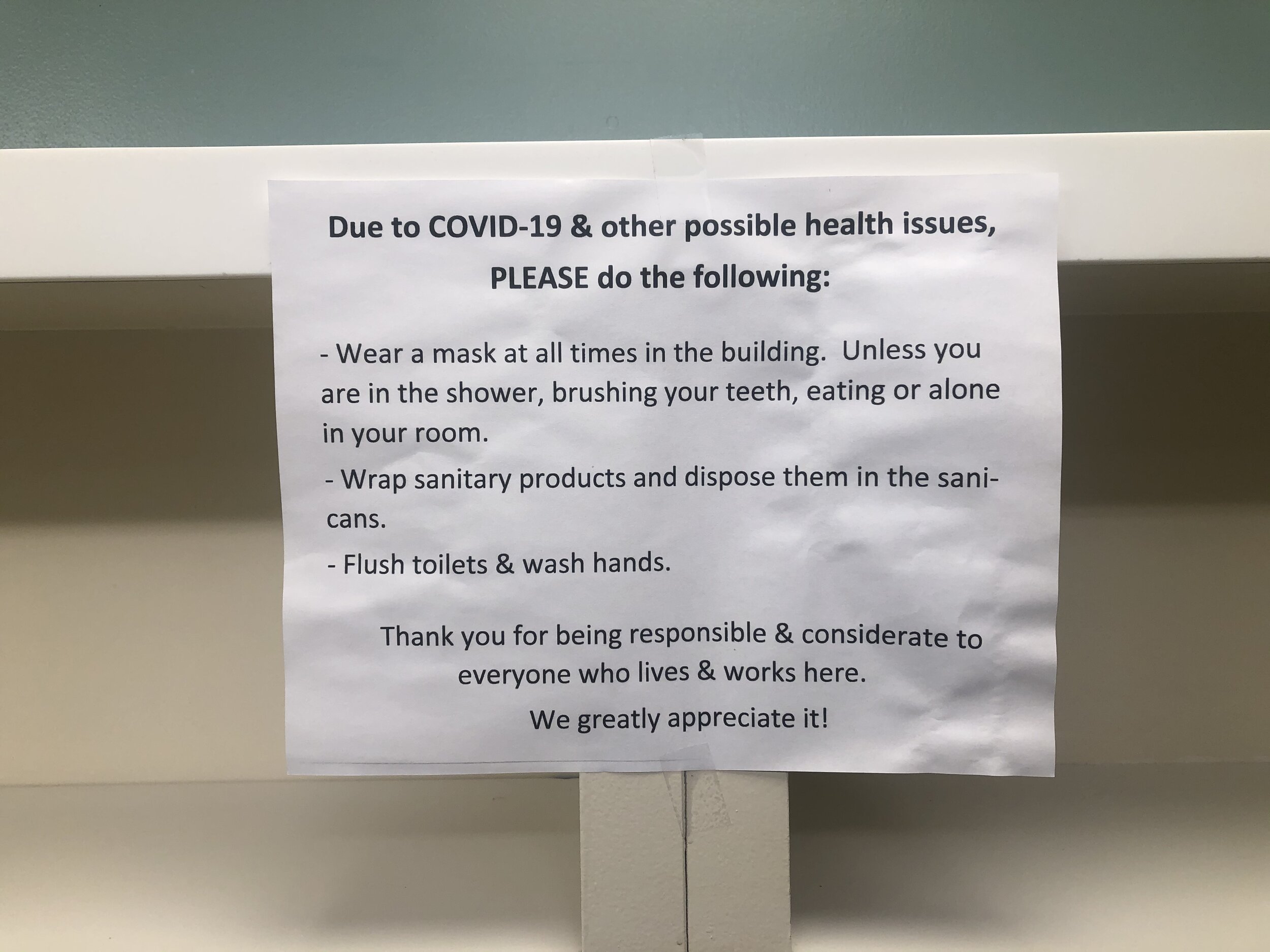Pictured above MHC’s on-campus regulations issued for COVID-19 prevention. Photos by Nina Gilkyson ‘22
By Casey Roepke ’21
News Editor
The group of student residential staff living on the College’s campus this fall is drastically smaller than previous years and they are working in unprecedented circumstances. Abiding by the social compact, and in some cases enforcing it, the responsibilities of Community Assistants (formerly known as Community Advisors) and Residential Fellows (formerly Senior Community Advisors) have shifted in response to COVID-19’s interruption to campus life.
As reported by the Mount Holyoke News earlier this year, students were told they could not work their residential staff jobs remotely. According to Associate Dean of Students and Director of Residential Life Rachel Alldis, the on-campus student residential staff has been reduced to 14 students — five Residential Fellows and nine Community Assistants — spread across four dorms.
“Normally we have a staff of 92, so at this moment 78 are not working,” Alldis said. “But we are still exploring some potential remote options that I hope to know more about soon.”
For the CAs and RFs on campus, roles and responsibilities have changed from past experiences.
“Being a CA this year is very different from last year,” Alex Moreno ’22 said. Moreno is working in ResLife for her second year as a CA and RF in the Rockies. “One of the biggest policies implemented is a ‘no-knock’ rule. This means that residents are not allowed to knock on our doors as a means to get in contact [with] us, but rather should email us instead.”
The “no-knock” rule is not the only new policy to reduce interface between student staff and residents. In previous years, S/CAs were “on duty” four to six Friday/Saturday weekends and readings days per semester, conducting at least three sets of rounds from 9 p.m. to 5 a.m., according to the Community Advisor job description from the 2019-2020 academic year. In contrast, CAs and RFs this fall are required to be “on duty” daily.
“When on duty, we hold a virtual Zoom hour where residents can drop in if they would like to talk to us or have a problem,” Moreno said. “All of my interactions with residents have been through Zoom and emails, which is very strange to say.”
Anya Chinniah ’21 has also been adjusting to a new system of building community in her residence hall, South Rockefeller. Instead of meeting residents in the hallways, Chinniah describes having to be on duty “every night instead of just on weekends where [residential student staff] have to stay on a Zoom call in case students have any questions.”
While the change in responsibilities has not been accompanied by a change in pay (except with a cap on student work hours), Alldis is aware that the residential student workers are facing different challenges.
“We are not as focused on programming, but on individual connections, and we have added more time on duty for staff to help enforce the community compact and ensure the health and safety of all of our students,” Alldis said.
Moreno said that she and other ResLife student staff have been partially responsible for enforcing the social compact that all residential students signed before living on campus in the fall, but that they are trying to avoid conflict.
“We are responsible for enforcing the community compact to a certain extent, such as making sure residents don't have guests from off-campus or other res halls inside the building,” Chinniah said. “If we are made aware of students leaving the 10-mile radius or not abiding by the community compact, it is our job to reach out to the resident of concern and talk to them before reporting it to the area coordinators.”
“Positive confrontation is a big part of ResLife, so we ask residents to email and talk — from a safe distance, i.e. email or 6 feet away — to each other if they see someone without a mask. … We try our best to confront those who may not uphold the compact but we cannot force anyone to act in a way they do not want to,” said Moreno. “ResLife does have a system for reporting instances of breaches to the compact but on-campus students have done a great job so far at respecting and maintaining the compact.”
This reporting system is a form accessible online, and any student living on campus can report an instance of breaking the social compact.
“I do think that the College has provided CAs with a good support system,” Chinniah said. “The only thing that some of the other CAs and I were concerned about is that we do not have hazard pay.”
Overall, Moreno said that she feels safe and comfortable with the College’s changes to campus life, although it feels very different from past years.
“I think when it comes to living on campus, many of the students here didn’t have a choice. They came back as a last resort, myself included,” she said. “I am grateful for having stable housing and some stable income, but the financial aid office did not make it easy to come back. … Safety Net funding did not give me significant support either. Resources for [COVID-19] are much more than just testing and a well-sanitized campus and I am eager to see how else Mount Holyoke will disperse resources directly to students.”


